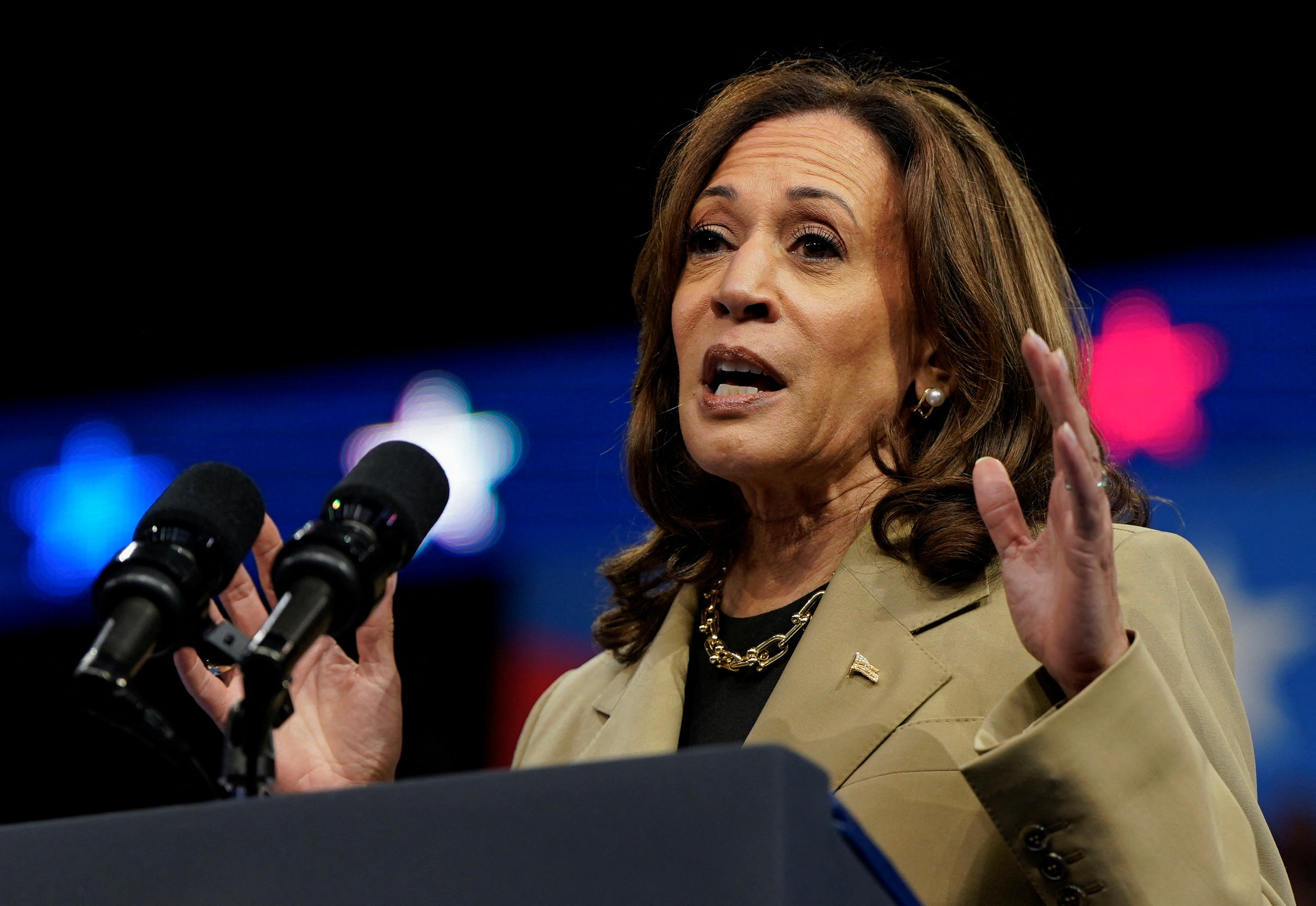WASHINGTON—Shortly after President Biden announced his decision to drop out of the race , an informal group of economic advisers began quietly discussing how to best articulate Vice President Kamala Harris ’s economic vision. Their challenge: differentiating the candidate from her unpopular boss without abandoning his policies.
Harris’s team is now crafting a policy framework focused on making housing more affordable, lowering costs for families, taking on corporate excess and boosting small businesses, according to people involved in the discussions.
The plan is intended to make her priorities clear to voters amid criticism that she hasn’t presented a detailed agenda during her first few weeks on the campaign trail. But aides said the exact contours of the plan are still in flux days after Harris told reporters that she planned to release a policy platform this week, a time frame that surprised some of her advisers. Harris is expected to test drive her messaging during a Friday speech in Raleigh, N.C., that will focus on decreasing costs and confronting alleged price gouging .
When she does put out a more detailed agenda, which could come in the form of several plans released in the coming weeks, she is unlikely to break with Biden on substance, according to her advisers. Instead, they expect small shifts in emphasis that highlight her résumé and priorities . Harris is planning to lean into her background as a prosecutor, as well as her focus on issues such as paid family leave as a senator and vice president.
Harris, the first Black woman to become a major party’s nominee , is known to encourage staff to look at policy issues through the prism of how they affect women, children and minorities, and she plans to help drive that message on the campaign trail. She was a vocal supporter of the Biden administration’s proposals to make child care and eldercare more affordable.
“She recognizes that there are particular places within their shared agenda where her values and her voice could particularly shine through,” a Harris adviser said.
Though Biden repeatedly went after corporations for alleged price gouging, Harris’s advisers believe they can use the vice president’s experience as attorney general to draw renewed attention to the issue on the campaign trail.
Harris has made taking on wrongdoing in American corporations a central part of her pitch to voters. “As attorney general, I held Wall Street banks accountable for fraud,” she has said in recent rallies, referring to her role in a multistate mortgage settlement during the foreclosure crisis.
In a sign that Harris is also willing to get ahead of Biden on policy, she called on Saturday for ending taxes on tips, embracing an idea first advanced by her Republican rival, Donald Trump . Biden hadn’t backed the proposal before Harris’s Saturday remarks. The White House said on Monday, two days after Harris’s endorsement of the proposal, that Biden supports it.
“They’ve been aligned for the last 3½ years,” White House press secretary Karine Jean-Pierre said this week. “There’s not been any daylight.”
Harris has embraced key parts of Biden’s agenda, while distancing herself from proposals she backed during the 2020 campaign, when she moved to the left as she competed with progressives such as Sen. Bernie Sanders (I., Vt.). In recent weeks, Harris pledged not to raise taxes on anyone making less than $400,000 a year, continuing a bedrock element of Biden’s economic agenda. She also walked back her previous support for banning fracking.
As they flesh out Harris’s agenda, her economic advisers have debated how detailed they should be, some of the people familiar with the discussions said, amid concerns from some Democrats that releasing a lengthy plan could open the vice president up to criticism from Republicans and members of her party. The policy framework is expected to outline broad policy areas she supports, while avoiding many of the thorny details. Aides said they want her agenda to provide a contrast with Trump without reading like a think tank white paper.
Harris’s ascension to the top of the ticket has energized Democrats and some allies have cautioned against doing anything that could slow that momentum, including lengthy interviews with media outlets.
Harris’s economic team includes: Brian Nelson , a former Treasury Department official; Mike Pyle , a longtime Harris aide and Biden’s former deputy national security adviser for international economics; former National Economic Council Director Brian Deese ; former Biden economic adviser Gene Sperling ; Deanne Millison , Harris’s former chief economic adviser; Rohini Kosoglu , Harris’s former domestic policy adviser; and Grace Landrieu , a former Biden economic aide.
Harris’s team has also sought input from current and former Biden administration officials, including Bharat Ramamurti , a former deputy director of the National Economic Council and a longtime aide to Sen. Elizabeth Warren (D., Mass.).
As vice president, Harris has built relationships with chief executives and other business leaders, holding regular private dinners with executives at her Naval Observatory residence. The Harris team has sought feedback and advice from Wall Street financier Blair Effron , co-founder of investment bank Centerview Partners, and former tech CEO Charles Phillips , co-chair of the Black Economic Alliance, according to people familiar with the matter.
Harris is also close to World Bank Group President Ajay Banga ; Microsoft President Brad Smith ; and former American Express CEO Ken Chenault , co-founder of OneTen, which works to create well-paying jobs for Black Americans.
Harris’s coming policy agenda will focus broadly on the pocketbook issues facing working families with young children, advisers said. She is expected to call for paid family leave, affordable child care, less costly healthcare and drug prices, and an expanded child tax credit. Those are all issues that Biden proposed early in his term, but were rejected by Republicans and some Democrats.
Lowering the cost of housing will also be a central part of her agenda, according to advisers. Amid mounting frustration from voters about the cost of rent and high mortgage rates, Harris’s team has been weighing new proposals to ease the burden, including additional tax credits for home buyers and incentives for local and state governments to build more affordable housing, people familiar with the matter said.
Meanwhile, Harris has embraced the Biden administration’s housing plans. She has called on the campaign trail for Congress to pass legislation that would withhold key tax breaks from landlords who control properties with more than 50 units if they don’t agree to limit rent increases to a maximum of 5%.
Harris’s advisers are also looking at ways to boost small businesses, advisers said, hoping to build on an effort she spearheaded alongside the Treasury Department to help communities get access to the capital needed to recover from the Covid-19 pandemic.
Harris struggled during the 2020 Democratic primary to articulate a detailed policy vision when she was pressed for specifics in interviews or on the debate stage. As a senator, Harris supported Medicare for All, which would shift the healthcare system from private and employer-based insurance to a government-run program.
But in 2020, during her run for the White House, she released a more moderate proposal to expand access to Medicare while keeping private insurance intact. Harris, however, gave varying responses on the role of private insurance in her plan, and at one point said after a debate that she misunderstood a question on the subject.
Write to Andrew Restuccia at andrew.restuccia@wsj.com , Tarini Parti at tarini.parti@wsj.com and Emily Glazer at Emily.Glazer@wsj.com



